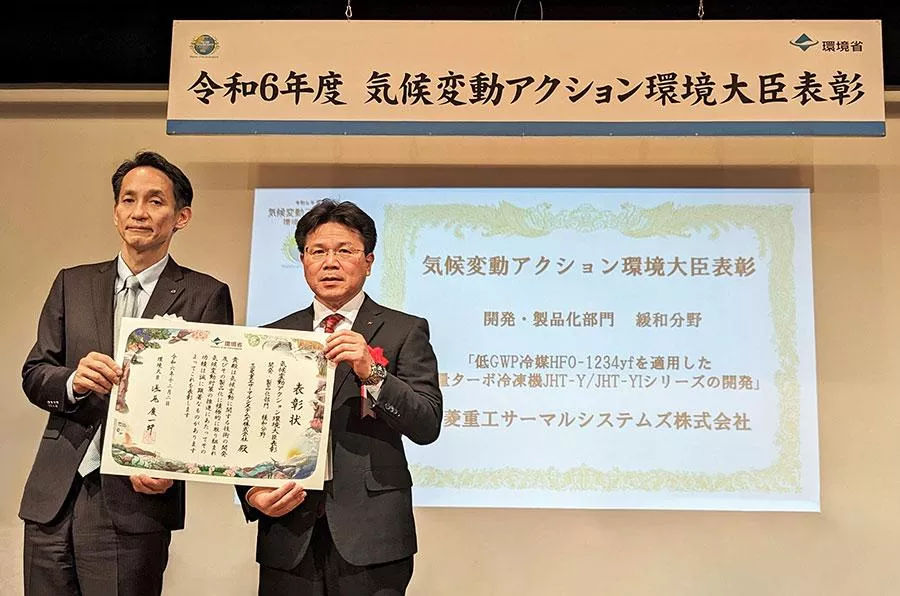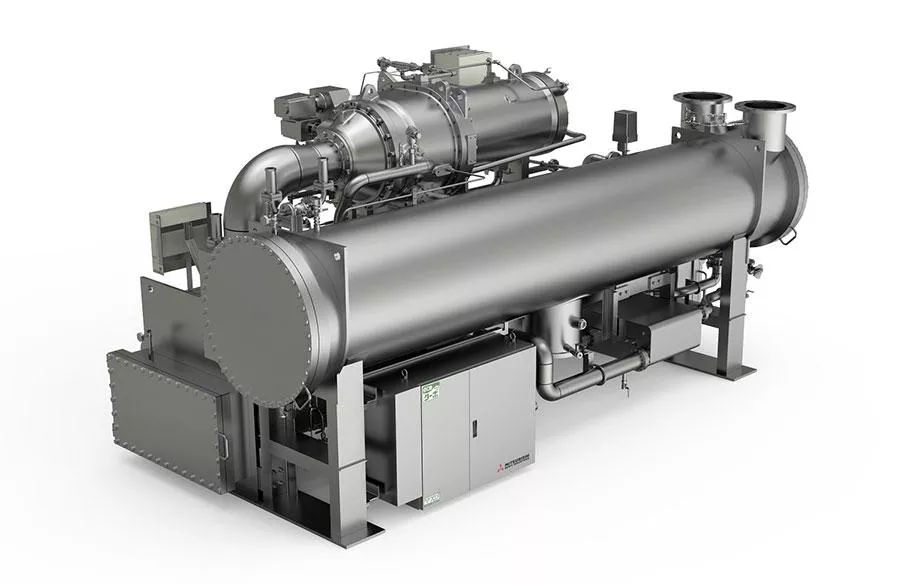Mitsubishi Heavy Industries Thermal Systems, Ltd. (MHI Thermal Systems), a part of Mitsubishi Heavy Industries (MHI) Group, has received a Minister of the Environment Award for Climate Action 2024 for development of its JHT-Y/JHT-YI series of large-capacity centrifugal chillers adopting the HFO-1234yf refrigerant with a low GWP(1). The award, sponsored by the Japanese Ministry of the Environment, was presented in the Technological Development and Commercialization category. An awards ceremony took place in Tokyo on December 2.

The Minister of the Environment for Climate Action Award program was renewed in 2020 to reflect recent trends in climate change measures and succeeded the Environment Minister’s Awards for Global Warming Prevention Activity, which had been held since 1998. The awards are given annually to individuals or groups having made noteworthy contributions to climate change mitigation (measures to curb greenhouse gas emissions) and accommodation to climate change (measures to avert or reduce impacts from climate change). This 2024 award is MHI Thermal Systems’ third to date: in 2019, the Company received an Environment Minister’s Award for its high-efficiency centrifugal chiller ETI-Z series that adopt a low-GWP refrigerant(2); and in 2021, the Company garnered the award for development and promotion of an air-to-water type heat pump using a low-GWP refrigerant(3).
The constant-speed JHT-Y and inverter-equipped JHT-YI are new series for large-capacity centrifugal chillers launched in June 2022. Both models in the series adopt the HFO-1234yf refrigerant with extremely low environmental impact (GWP below 1) and the capacities ranging from 300 to 5,400 refrigeration tons (RT)(4). The JHT-Y and JHT-YI are the first centrifugal chillers with capacities up to 5,400 RT commercially offered in Japan with a low-GWP refrigerant. With a newly designed compressor, outstanding efficiency has been achieved: the constant-speed model to achieve a maximum rated COP(5) of 6.4, the inverter-equipped model achieves an IPLV(6) of 8.8 and a maximum part load COP of 24.9. A smaller compressor size, together with the optimized centrifugal chiller structure layout, also contributes to the effective use of the space, enabling smooth installation from existing equipment. The replacement of an existing equipment using a higher-GWP HFC (hydrofluorocarbon) refrigerant with the JHT-YI can reduce annual energy consumption and CO2emissions by approximately 65%(7), contributing significantly to mitigating environmental impacts. The JHT-Y and JHT-YI models are also adaptable to a wide range of applications: air-conditioning, heating, as well as low-temperature and heating processes in beverage plants, etc.
The HFO-1234yf refrigerant, which is also used in car air-conditioners and vending machines, has a GWP of below 1 and ODP(8) of zero, and is categorized as non-Freon refrigerant according to Japan’s Revised Fluorocarbons Recovery and Destruction Law(9). For these reasons, it is not subject to this Law that regulates the Fluorocarbons’ emissions into the atmosphere, recovery, and destruction after usage. Concerning an equipment with higher-GWP HFC refrigerant including HFC-134a, which was widely used before the revised legislation took effect, it has been made compulsory to reduce in both their production and usage volumes as it has a significant impact on global warming. In 2025 and onward, it is scheduled that the regulations on the supply of equipment with higher-GWP refrigerants to the market will be tightened further in the Japanese market, therefore, currently the demands for the equipment with low-GWP refrigerants, ex. the JHT-Y/JHT-YI series, are increasing and earlier upgrading is required in the market.
MHI Thermal Systems is Japan’s leading manufacturer of centrifugal chillers, having delivered numerous units for district cooling/heating, factory air-conditioning, etc. Going forward, the Company will continue to focus on developing high-performance products using low-GWP refrigerants covering – together with the small and medium-capacity ETI-Z series – a capacity span of 150 to 5,400 RT, as its way of contributing to environmental protection on a global scale.
(1) GWP: global warming potential. CO2 is assigned a GWP of 1. The lower the GWP factor, the less impact on the environment.
(2) For further information, refer to the following press release: https://www.mhi.com/news/191203.html
(3) For further information, refer to the following press release: https://www.mhi.com/news/21112502.html
(4) Capacity above 2,700 RT requires two compressors (parallel type).
(5) COP: coefficient of performance as calculated based on Japanese Industrial Standards (JIS). The higher the COP, the higher the level of energy savings.
(6) IPLV: integrated part load value, an indicator of the efficiency of an air-conditioner during part load operation. The higher the IPLV, the higher the level of energy savings.
(7) Compared with our previous model (20 years ago)
(8) ODP: ozone depletion potential, a coefficient expressing the relative amount of degradation to the ozone layer compared to trichlorofluoromethane (CFC-11), a refrigerant previously in wide use which has a fixed ODP of 1.0. The lower the ODP, the lower the destructive impact on the ozone layer.
(9) This revised law, which took effect on April 1, 2015, stipulates rules for the rational use and proper management of fluorocarbons.

About MHI Group
Mitsubishi Heavy Industries (MHI) Group is one of the world’s leading industrial groups, spanning energy, smart infrastructure, industrial machinery, aerospace and defense. MHI Group combines cutting-edge technology with deep experience to deliver innovative, integrated solutions that help to realize a carbon neutral world, improve the quality of life and ensure a safer world. For more information, please visit www.mhi.com or follow our insights and stories on spectra.mhi.com.


